Radioactive Waste Management - Public Attitudes Survey for Scotland
This report summarises findings from a representative survey of the Scottish public that provides new insights into the perceptions and views towards radioactive waste management in Scotland.
Chapter 2: Knowledge of Radioactive Waste Management
This section explores the public's current level of knowledge of radioactive waste management, the appetite for new information and perceptions about radioactive waste management.
2.1 Levels of knowledge
Many respondents (89%) did not think they are well informed about radioactive waste management in Scotland: more than half (53%) of respondents thought they were not at all informed while 36% felt not very well informed. Only one in ten (10%) felt well-informed about radioactive waste management in Scotland (8% felt 'fairly well informed' and 1% felt 'very well informed') (Figure 2.1).
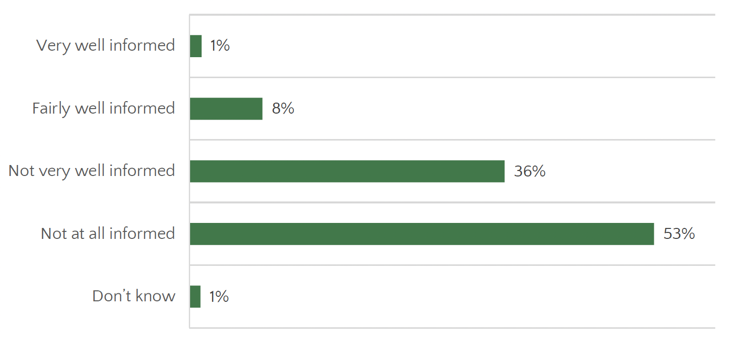
Base: All (2,158)
Self-reported levels of knowledge differ by gender (Figure 2.2). A higher proportion of male respondents than female respondents reported that they felt well-informed on matters relating to radioactive waste management, however this remains a small proportion of either gender (14% vs 6%).
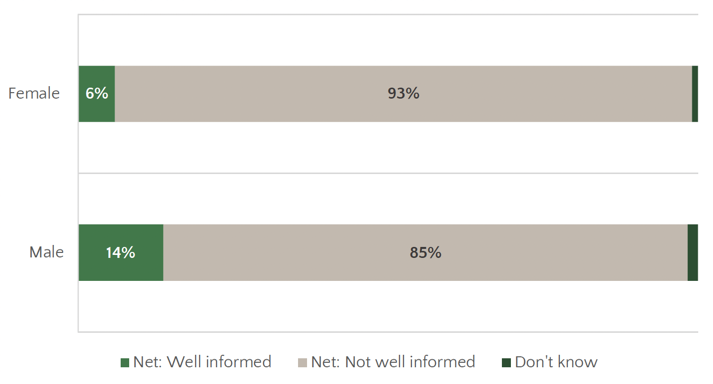
Base: Male (1,040), Female (1,118)
Self-reported knowledge also differs by Scottish Index of Multiple Deprivation (SIMD) areas (Figure 2.3). Those respondents in the least deprived areas (SIMD5) were more likely to feel well informed (11%) than those in the most deprived areas (6%) (SIMD1)(Figure 2.3).
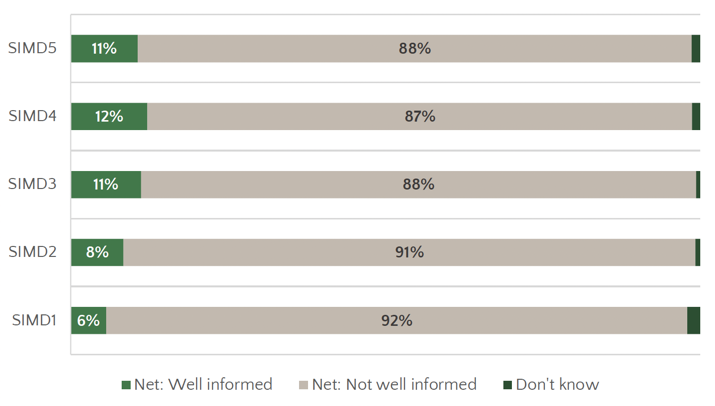
Base: SIMD1 (326), SIMD2 (381), SIMD3 (438), SIMD4 (494), SIMD5 (428)
The vast majority of respondents (96%) had not attempted to find information about the way radioactive waste is managed in Scotland (Figure 2.4). Only 4% of respondents had attempted to source this information.
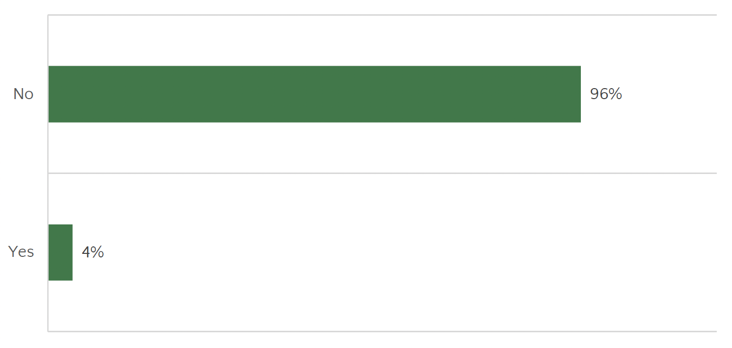
Base: All (2,158)
More than half of respondents (55%) said they want to know more about radioactive waste management in Scotland, while 45% do not (Figure 2.5).
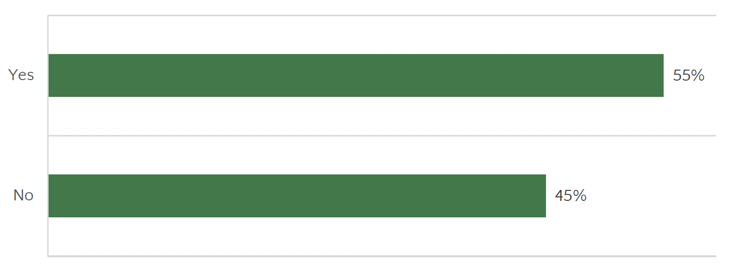
Base: All (2,158)
2.2 Sources of information
The sources of information the respondents would use to find information about the way radioactive waste is managed in Scotland varied. Almost half would source information from scientists or academia (45%), a search engine or the internet (44%), the Scottish Government (43%) or regulators of the nuclear industry (43%).
Around a third would look to non-governmental organisations (NGOs) concerned about the environment (35%) or international organisations working on peaceful uses of nuclear technology (29%) for information on the way radioactive waste is managed. Fewer would look to the media (13%) or friends and family (7%) for information (Figure 2.6).
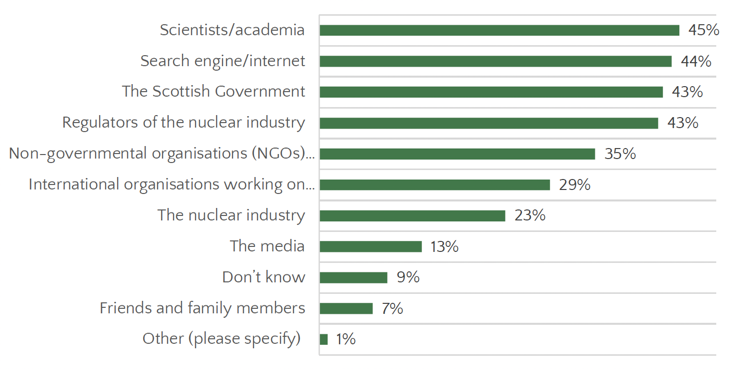
Base: All (2,158)
Other sources that respondents said they might refer to included books from the library, the UK Government and friends or family more specifically in the industry.
The level of trust the respondents have in these sources followed a different pattern. Scientists or academia were the most trusted source of information, with an average trust rating of 7.03 out of 10 (where 0 is do not trust at all and 10 is trust completely). Despite only one in three (29%) indicating they would use this as a source of information, international organisations working on peaceful uses of nuclear technology had an average trust rating of 6.09 (Figure 2.7). This is closely followed by regulators of the nuclear industry (5.90) and non-governmental organisations (NGOs) concerned about the environment (5.79).
The nuclear industry (4.76), the Scottish Government (4.71) and search engine/internet (4.57) had scores which were slightly below the midpoint of five out of 10. However, the sources the respondents trust the least were friends and family members (3.80) and the media (3.54).
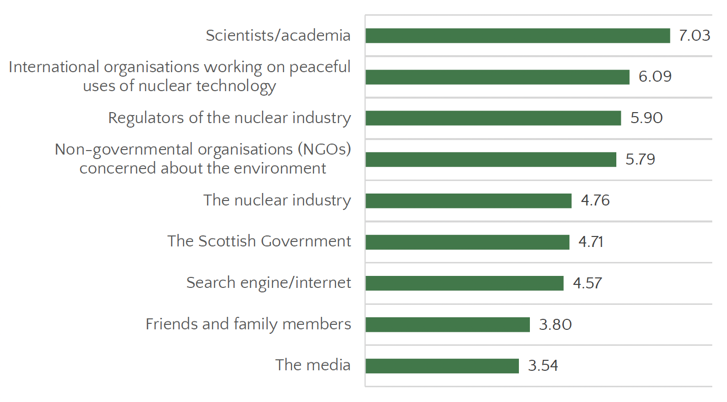
Base: All (2,158)
2.3 Public education on radioactive waste management
The respondents were broadly in agreement that institutions should do more to educate the public (Figure 2.8). In particular, the regulators of the Scottish nuclear industry (81% strongly or tend to agree), the Scottish Nuclear industry (80% strongly or tend to agree) and the Scottish Government (79% strongly or tend to agree) should do more to inform the public about radioactive waste management.
Fewer believed media should do more to inform the public about radioactive waste management (60% strongly or tend to agree) which perhaps reflects relatively low trust in the media as discussed above.
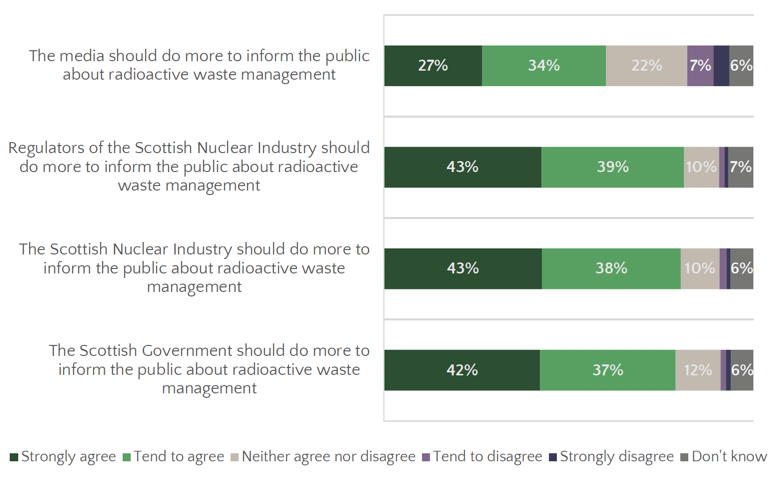
Base: All (2,158)
2.4 Perceptions of radioactive waste management
Respondents were presented with six statements about radioactive waste. They were then asked to indicate whether they thought each statement was true or false. In this instance, all of the statements were true (Figure 2.9).
The majority of respondents correctly identified that some hospitals produce radioactive waste (81%), that there are several categories of radioactive waste, for example, low, intermediate and high-level radioactive waste (73%) and that radioactive waste is a byproduct of nuclear power generation (71%). Just over two thirds identified the statement that some scientific research centres produce radioactive waste as true (69%). Only one fifth of respondents correctly identified that radioactive waste management is a devolved matter (i.e. the Scottish Parliament has power to make laws on radioactive waste management).
While the proportion of respondents which identified each of the statements as false was relatively low, the proportion selecting the 'don't know' option was often relatively high. Three in five respondents selected 'don't know' for the statement on radioactive waste management being a devolved matter (61%) while over a third selected the 'don't know' option for the statement on whether other non-nuclear industries in Scotland produce radioactive waste (38%). Three in ten (30%) also selected 'don't know' for the statement on whether scientific research centres produce radioactive waste.
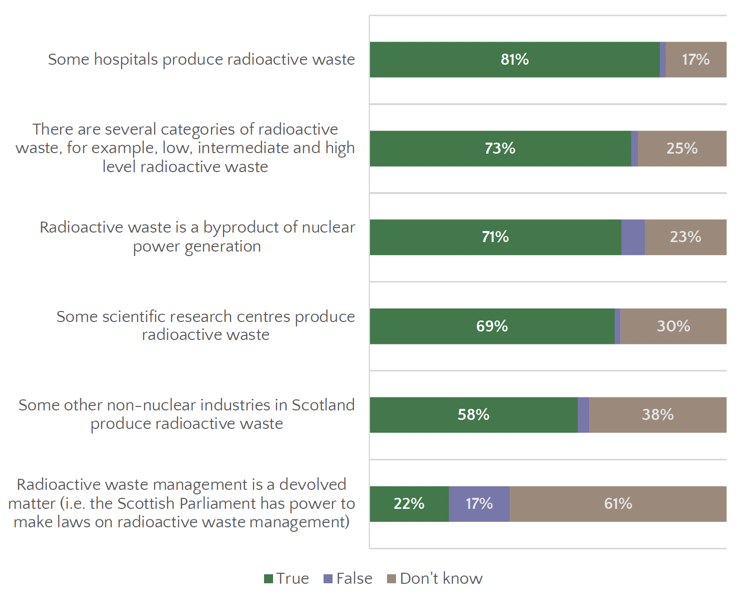
Base: All (2,158)
Respondents were then presented with statements exploring how radioactive waste is currently managed in Scotland (Figure 2.10).
About two-thirds (63%) of respondents incorrectly identified that some radioactive waste is disposed of in deep underground sites while a third did not know if this was true or false (34%). A third of respondents also incorrectly identified that some radioactive waste is dumped at sea (30%) while a fifth (21%) knew this was false. The remaining half (49%) did not know if this was true or false.
Around half of all respondents did not know if some radioactive waste is reused or recycled (54%), some radioactive waste is disposed of in licensed landfill sites (48%) or some radioactive waste is put into solid form and packed into steel drums (47%). Overall, responses to this question indicate relatively limited knowledge about radioactive waste management among the respondents.
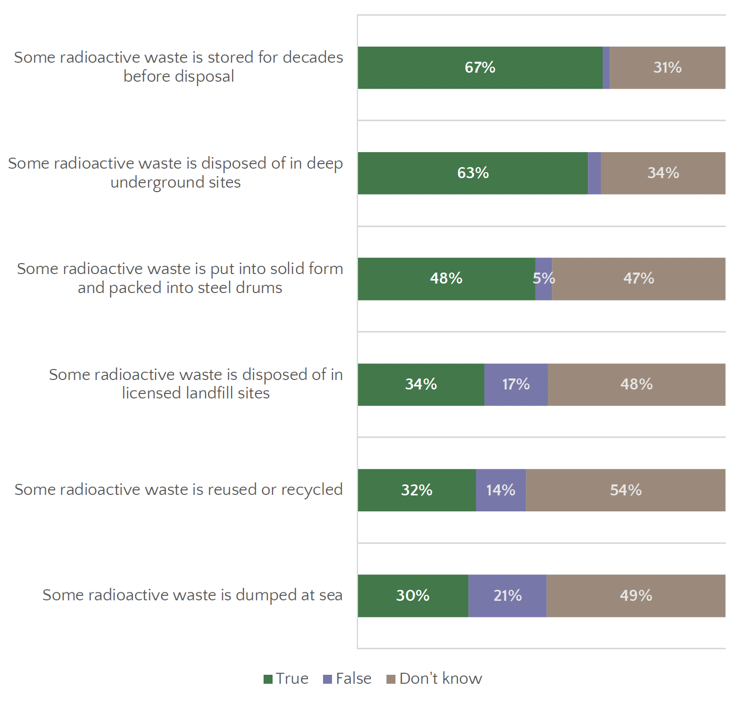
Base: All (2,156)
Respondents had the opportunity to add any further overall comments or reflections on radioactive waste management in Scotland. 751 respondents gave comments at this opportunity.
Several respondents re-iterated how radioactive waste management is a complex issue requiring a well-thought-out response. Many were of the view that radioactive waste should be managed, for the most part, by independent experts in this field. Nonetheless, there was some agreement that as many different groups and actors as possible should be consulted, to reach a solution which is mindful of all of those who are affected. Comprehensive planning, research into best practice and an openness to innovation were also seen as important:
"A totally comprehensive and integrated plan is necessary involving novel and innovative research, management and upskilling".
A few respondents suggested that the use of any materials that could produce harmful waste, whether radioactive or not, be eradicated. Others were of the view that investments should pivot towards renewable energy.
"A solution of waste management should not encourage more funding for radioactive materials in future, and investments should be made in renewable energy".
Respondents emphasised a need for both national and local authorities to choose site locations that are acceptable to all, or as one respondent put it, "not just big businesses":
"Do the research and engage with the local community before jumping into any construction of a facility in any capacity".
"There should be a country-wide approach. Local residents must be consulted in depth and timeously to stave off Nimbyism [Not in my backyard-ism]".
Thinking about the impact of radioactive waste on health and the environment, many respondents felt that waste management facilities should not be situated near populated areas:
"I said I wouldn't want it in my local area, not because of Nimbyism but because I live in a densely populated part of the city and I think a less populated area would make more sense".
A few respondents commented on the role of the survey itself as an awareness raising piece. Some wondered why a survey was being undertaken on the topic of radioactive waste management now, and felt that plans for disposal should have been decided when plants were initially implemented. Others noted that the survey had raised their awareness of the issue of radioactive waste management, given them "something to think about", and prompted them to find out more:
"I was unaware there are plans afoot for changes to current [radioactive] waste management and this survey has given me that knowledge".
"I realise I am quite ignorant of the facts about how nuclear waste is currently managed, yet I feel strongly that it should be appropriately risk assessed and managed safely. I intend to find out more about how this happens currently and about plans for the future management of nuclear waste".
"I do feel the opinion of someone like myself (if given some basic knowledge around this topic) could be valuable in these types of discussion".
Contact
There is a problem
Thanks for your feedback